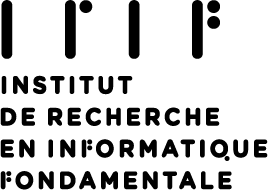
Site Entries:On this page :


- TITLE: Polymorphic records in a system with union, intersection, and negation types and their application to the Elixir language
- References
- Additional Readings
- Contact



Master project description
TITLE: Polymorphic records in a system with union, intersection, and negation types and their application to the Elixir language
Context
CDuce [1,2] is a programming language which is based on and uses set-theoretic types (union, intersection and negation types). The polymorphic version of CDuce [3,4] is available on the language's git repository, but it is not yet distributed. If the treatment of polymorphic functions is quite successful (see [5] for an overview of the possibilities offered by polymorphic set-theoretic types), there is still an important gap to be filled before having a language possessing a satisfactory degree of polymorphism: records are still monomorphically typed.
Elixir
 is a dynamic functional programming language that runs on the Erlang Virtual Machine. The language has been gaining adoption over the last years in areas such as web applications, embedded systems, data processing, distributed systems, and more. It is used by companies such as PagerDuty, Discord, and Pinterest.
is a dynamic functional programming language that runs on the Erlang Virtual Machine. The language has been gaining adoption over the last years in areas such as web applications, embedded systems, data processing, distributed systems, and more. It is used by companies such as PagerDuty, Discord, and Pinterest.
The Research Institute on the Foundations of Computer Science (IRIF) in Paris has started a collaboration with Dashbit and José Valim, the author of Elixir, to define and implement a type system for the language. The system we are devising is a polymorphic type system featuring union and intersection types, occurrence typing, and gradual typing. Record types play an important role in Elixir and, more generally, in dynamic languages. The long term goal of this internship is to develop the polymorphic typing of Elixir records and possibly contribute to its implementation in the Elixir type checker.
Goals
The typing of records with set-theoretic types is based on an elegant theory of quasi-finite functions which has been defined and described in detail in Chapter 9 of [6] (for a quick overview you can consult appendix C2 of [7]).
The goal of this internship is to extend this theory to allow polymorphic typing of records. For that we will introduce row variables [8,13] to capture and describe the infinite part of the quasi-finite functions representing record types. It will be necessary to develop the theory, to prove its soundness and to study possible extensions. Among the latter there are the study (1) of the compatibility with type reconstruction (see thesis of Petrucciani [9]) and/or (2) of the compatibility with occurrence typing and the reconstruction of intersections of arrows for functions, such as they have been described in the article [7] already cited. It will then be necessary to use the results obtained to implement the polymorphic typing of the records for the polymorphic version of CDuce.
Depending on the progress of the internship and the results obtained, we may also study whether it is possible to adapt the theory in question so that it can be applied to the typing of dynamic languages, in other words, we will check whether it is possible to use the said theory to type JavaScript objects and/or we will try to develop techniques which allow to type records with calculated labels (and, if so, we will apply this to the typing of "maps" of the Elixir language [10]).
References
- [1] V. Benzaken, G. Castagna, and A. Frisch: CDuce: an XML-Centric General-Purpose Language
 . In ICFP '03, 8th ACM International Conference on Functional Programming, pag. 51―63, ACM Press, 2003.
. In ICFP '03, 8th ACM International Conference on Functional Programming, pag. 51―63, ACM Press, 2003. - [2] The CDuce Programming Language

- [3] G. Castagna, K. Nguyễn, Z. Xu, H. Im, S. Lenglet, and L. Padovani: Polymorphic Functions with Set-Theoretic Types. Part 1: Syntax, Semantics, and Evaluation
 . In POPL '14, 41st ACM Symposium on Principles of Programming Languages, pag. 5―17, January, 2014.
. In POPL '14, 41st ACM Symposium on Principles of Programming Languages, pag. 5―17, January, 2014. - [4] G. Castagna, K. Nguyễn, Z. Xu, and P. Abate: Polymorphic Functions with Set-Theoretic Types. Part 2: Local Type Inference and Type Reconstruction
 . In POPL '15, 42nd ACM Symposium on Principles of Programming Languages, pag. 289―302, January, 2015.
. In POPL '15, 42nd ACM Symposium on Principles of Programming Languages, pag. 289―302, January, 2015. - [5] Giuseppe Castagna: Programming with union, intersection, and negation types
 , November, 2021. Unpublished manuscript (arXiv:2111.03354).
, November, 2021. Unpublished manuscript (arXiv:2111.03354). - [6] Alain Frisch: Théorie, conception et réalisation d’un langage de programmation adapté à XML
 . PhD thesis, Université Paris 7 – Denis Diderot, 2004.
. PhD thesis, Université Paris 7 – Denis Diderot, 2004. - [7] Giuseppe Castagna, Mickaël Laurent, Kim Nguyen, and Matthew Lutze: On Type-Cases, Union Elimination, and Occurrence Typing
 . Proc. ACM Program. Lang., vol. 6, n. POPL, January, 2022.
. Proc. ACM Program. Lang., vol. 6, n. POPL, January, 2022. - [8]François Pottier:
A versatile constraint-based type inference system
 Nordic Journal of Computing, Volume 7, Issue 4, Winter 2000 pp 312–347
Nordic Journal of Computing, Volume 7, Issue 4, Winter 2000 pp 312–347
- [9] Tommaso Petrucciani: Polymorphic set-theoretic types for functional languages
 . Joint PhD thesis. Università di Genova; Université Sorbonne Paris Cité – Université Paris Diderot, 2019.
. Joint PhD thesis. Università di Genova; Université Sorbonne Paris Cité – Université Paris Diderot, 2019.
- [10] The Elixir Programming Language

Additional Readings
- [11] G. Castagna: Covariance and Contravariance: a fresh look at an old issue (a primer in advanced type systems for learning functional programmers)
 . Logical Methods in Computer Science, n. 16, pag. 15:1―15:58, 2020.
. Logical Methods in Computer Science, n. 16, pag. 15:1―15:58, 2020. - [12] G. Castagna and A. Frisch: A gentle introduction to semantic subtyping
 . In Proceedings of PPDP '05, the 7th ACM SIGPLAN International Symposium on Principles and Practice of Declarative Programming, pages 198-208, ACM Press (full version) and ICALP '05, 32nd International Colloquium on Automata, Languages and Programming, Lecture Notes in Computer Science n. 3580, pages 30-34, Springer (summary), July, 2005. Joint ICALP-PPDP keynote talk.
. In Proceedings of PPDP '05, the 7th ACM SIGPLAN International Symposium on Principles and Practice of Declarative Programming, pages 198-208, ACM Press (full version) and ICALP '05, 32nd International Colloquium on Automata, Languages and Programming, Lecture Notes in Computer Science n. 3580, pages 30-34, Springer (summary), July, 2005. Joint ICALP-PPDP keynote talk. - [13] Didier Rémy: Type checking records and variants in a natural extension of ML
 . POPL '89: Proceedings of the 16th ACM SIGPLAN-SIGACT symposium on Principles of programming languages, January 1989
. POPL '89: Proceedings of the 16th ACM SIGPLAN-SIGACT symposium on Principles of programming languages, January 1989
Contact
Giuseppe Castagna  : IRIF, Research Institute on the Foundations of Computer Science, Université de Paris.
: IRIF, Research Institute on the Foundations of Computer Science, Université de Paris.
|
|



